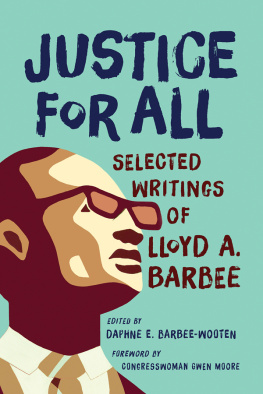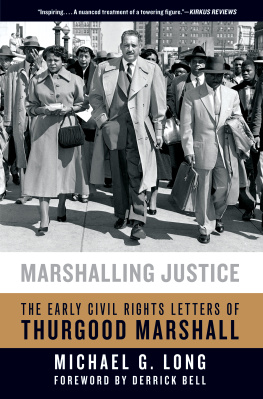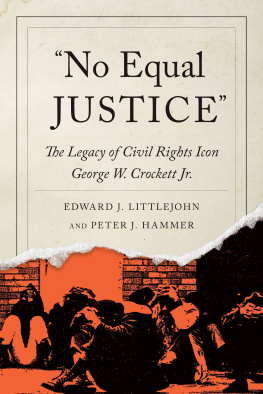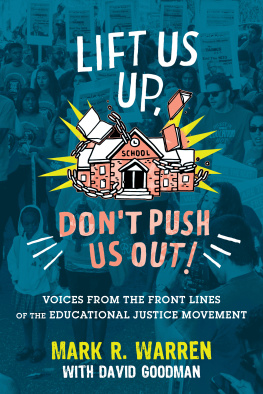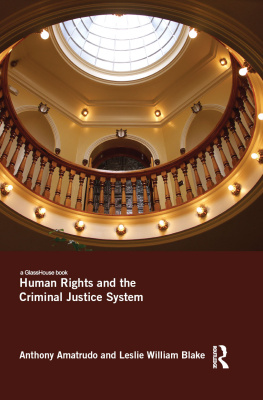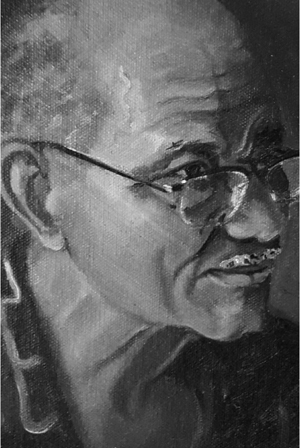JUSTICE FOR ALL
Selected Writings of Lloyd A. Barbee
Edited by
DAPHNE E. BARBEE-WOOTEN
Foreword by
CONGRESSWOMAN GWEN MOORE
WISCONSIN HISTORICAL SOCIETY PRESS
Published by the Wisconsin Historical Society Press
Publishers since 1855
The Wisconsin Historical Society helps people connect to the past by collecting, preserving, and sharing stories. Founded in 1846, the Society is one of the nations finest historical institutions.
Join the Wisconsin Historical Society: wisconsinhistory.org/membership
2017 by Daphne E. Barbee-Wooten
E-book edition 2017
For permission to reuse material from Justice for All (ISBN 978-0-87020-838-6; e-book ISBN 978-0-87020-839-3), please access www.copyright.com or contact the Copyright Clearance Center, Inc. (CCC), 222 Rosewood Drive, Danvers, MA 01923, 978-750-8400. CCC is a not-for-profit organization that provides licenses and registration for a variety of users.
Interior images are from the Lloyd A. Barbee family collection.
The silhouette artwork on the cover was produced by Marion Loss for Lloyd Barbee Montessori School in Milwaukee. The frontispiece portrait is by Dennis Morton.
Cover design by TG Design
Typesetting by Integrated Composition Systems
21 20 19 18 17 1 2 3 4 5
Library of Congress Cataloging-in-Publication Data
Names: Barbee, Lloyd A., 19252002, author. | Barbee-Wooten, Daphne, editor.
Title: Justice for all : selected writings of Lloyd A. Barbee / edited by Daphne E. Barbee-Wooten ; foreword by Congresswoman Gwen Moore.
Other titles: Selections. | Selected writings of Lloyd A. Barbee
Description: Madison, WI : Wisconsin Historical Society Press, [2017] | Includes index. |
Identifiers: LCCN 2017009058 (print) | LCCN 2017025039 (e-book) |
ISBN 9780870208393 (E-book) | ISBN 9780870208386 (pbk. : alk. paper)
Subjects: LCSH: Barbee, Lloyd A., 19252002. | African AmericansWisconsinBiography. | African AmericansWisconsinSocial conditions20th century. | LegislatorsWisconsinBiography. | Civil rights movementsUnited StatesHistory20th century | African American civil rights workersBiography. | WisconsinPolitics and government1951 | ReformersWisconsinBiography. | LawyersWisconsinBiography. | African American lawyersBiography. | WisconsinRace relations.
Classification: LCC F586.42.K64 (e-book) | LCC F586.42.K64 B37 2017 (print) | DDC 328.73/092 [B]dc23
LC record available at https://lccn.loc.gov/2017009058
CONTENTS
Publication of this book was made possible
thanks to the generous support
of the Wisconsin Historical Society Press Readers Circle.
For more information and to join, visit
support.wisconsinhistory.org/readerscircle
Lloyd Barbee was a state legislator from a district in Milwaukee, Wisconsin, but there was no such thing as a district for Lloyd Barbee. He was statewide. He was nationwide.
I remember him as this extremely brilliant man, hard-working, revered, and respected in the community. He was there. He was not aloof. Even while serving in the legislature in Madison in the 1960s, he was always on the ground in Milwaukee. I saw and experienced it as a girl growing up there, and as one of the young people who was isolated by segregation in the Milwaukee Public Schools. Here was this lawyer, this legislator, this important man who never lost touch with the community he was fighting for.
When I think about my experience in a segregated school, I recognize that I got a good education. Milwaukee really was a leader in education then. But the isolation of segregated schools, and the reality of separate facilities that werent in fact equal, did have an impact on me and my fellow students at North Division High School. We couldnt do any of the experiments in the chemistry lab because we didnt have the equipment other schools had, for example. I rebelled against that, and we got a new school eventually. But I remember that it was Lloyd Barbee who was fighting, not just for desegregation, but for that fairness, that equal opportunity for all of us.
Lloyd Barbee fought the battle against separate-but-equal schools in Milwaukee with such dignity, such decency, and such respect for his constituents and allies. When I am traveling, I still meet people who worked with Barbee on his lawsuit for desegregation of the schools. He was with us in the neighborhoods, but he reached out nationally on behalf of that struggle. For him this was a national movement, one in which he enlisted the help of lawyers and supporters across the country. Thats how important he thought the battle in Milwaukee was.
I was a state legislator before becoming a member of Congress. But I dont think Wisconsin has ever had a legislator as prolific and profound as Lloyd Barbee. He was a pioneering black legislator, a trailblazer, and a true coalition builder. He drew white people, black people, Latinos, men, and women into these coalitions against segregation and injustice. And I think the reason he was so good at building those coalitions was because he really enjoyed listening to people and hearing what they needed. Lloyd Barbee understood that he needed to know what was important to people before he could truly represent them. Thats what I mean about how he respected people.
I cant say exactly what Lloyd Barbee would be fighting for if he were alive today. But I think he would still be focused on education, on making sure that Milwaukee Public Schools had the resources to educate its students well. He would be guarding against undermining public education. But he would have so many other struggles. The truth is that we could really use a Lloyd Barbee today. But I like to think we can still learn from him, and can still fight like he did. I know Im trying.
Gwen Moore
US House of Representatives
Fourth District
Milwaukee, Wisconsin
I am often asked what it was like to be Lloyd A. Barbees child. My short answer is it was fun and exciting, like riding a wave of history. My brothers, Finn Barbee and Rustam Barbee, and I went on marches for fair housing, participated in protests against segregation in the schools and discrimination at lunch counters, and picketed places that would not admit African Americans, such as the Elks Club. I remember marching for civil rights across the South Street bridge in Milwaukee, with the Milwaukee Commandos protecting the marchers while we were pelted with nails, glass, knives, and other weapons from angry whites who snarled and yelled the n word at us on the bridge. Like the marches in Selma, Alabama, marches for civil rights in Milwaukee were met with violent opposition. My father was at the forefront of these protests.
Milwaukee was very racially segregated during the 1960s and continues to be extremely segregated in housing, in public schools, and in work-places. The city saw riots in 1967 and riots in 2016. My father, who died in 2002, once wrote about the 1967 riots that erupted in Milwaukee in response to police brutality toward nonwhite or lower-income citizens. As excessive use of force by police officers continues to be debated long after my fathers death, it is clear that improvement and progress come slowly to places such as Milwaukee. As the children of a local civil rights leader, we learned the power of putting in hard work, taking a stand, and organizing on a grass-roots level. We marched against Bobs Big Boy restaurant when it refused to serve my brother Finn. My father organized the protest, and we marched outside with signs protesting Bobs Big Boy on Van Buren Street. When a friend of mine and I were not served ice cream at an ice cream parlor on the east side, my father drove us both down there and demanded to see the manager. We were able to get ice cream after my fathers confrontation with the manager.

